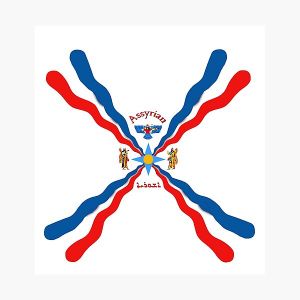Difference between revisions of "Language/Assyrian-neo-aramaic/Vocabulary/Feelings-and-Emotions"
m (Quick edit) |
m (Quick edit) |
||
| Line 8: | Line 8: | ||
__TOC__ | __TOC__ | ||
<span link>Take some time to dive into these other pages after completing this lesson: [[Language/Assyrian-neo-aramaic/Vocabulary/Greetings|Greetings]] & [[Language/Assyrian-neo-aramaic/Vocabulary/Geography|Geography]].</span> | |||
== Basic emotions == | == Basic emotions == | ||
Let's start with some basic emotions: | Let's start with some basic emotions: | ||
| Line 101: | Line 103: | ||
* Person 1: خَرافِيَا كَدِّيشَا بَهَالْجَەمَ؟ (Kharafiya kaddeisha bahaljama?) (Are you feeling emotional about this event?) | * Person 1: خَرافِيَا كَدِّيشَا بَهَالْجَەمَ؟ (Kharafiya kaddeisha bahaljama?) (Are you feeling emotional about this event?) | ||
* Person 2: لَا، بَشِّرَا تَمَّامْ. (La, bishira tammam.) (No, I'm feeling fine.) | * Person 2: لَا، بَشِّرَا تَمَّامْ. (La, bishira tammam.) (No, I'm feeling fine.) | ||
<span class='maj'></span> | <span class='maj'></span> | ||
| Line 117: | Line 117: | ||
}} | }} | ||
==Other Lessons== | |||
== | |||
* [[Language/Assyrian-neo-aramaic/Vocabulary/Clothes|Clothes]] | * [[Language/Assyrian-neo-aramaic/Vocabulary/Clothes|Clothes]] | ||
* [[Language/Assyrian-neo-aramaic/Vocabulary/Animals|Animals]] | * [[Language/Assyrian-neo-aramaic/Vocabulary/Animals|Animals]] | ||
| Line 131: | Line 130: | ||
{{Assyrian-neo-aramaic-Page-Bottom}} | {{Assyrian-neo-aramaic-Page-Bottom}} | ||
<span links></span> | |||
Latest revision as of 21:57, 27 March 2023
Hi Assyrian Neo-Aramaic learners! 😊
In this lesson, we will focus on vocabulary related to feelings and emotions. Understanding and expressing our emotions is a vital part of human communication. So let's dive into it with some interesting facts and cultural notes. Don't forget to use the hyperlinks to find more resources and to practice speaking with native speakers. 😁
Take some time to dive into these other pages after completing this lesson: Greetings & Geography.
Basic emotions[edit | edit source]
Let's start with some basic emotions:
| Assyrian Neo-Aramaic | Pronunciation | English |
|---|---|---|
| شِياخَا (shiyakha) | ʃijaχa | Angry |
| غَبَارِي (ghabari) | ɣabari | Sad |
| فَرحَان (farhan) | farhan | Happy |
| خَائف (kha'if) | xaːʔef | Afraid |
| شـَـبِير (shabir) | ʃabiːr | Brave |
For example:
- Person 1: شـَـبِيرْ دَەبْلَجِتْ؟ (Shabir dablajet?) (Are you feeling brave?)
- Person 2: نَمَە (nama) (Yes)
Confusing emotions[edit | edit source]
Sometimes, our emotions can be a little confusing to understand. Here are some words that express those more complex feelings:
1. عَوَاطِف (awatif) : Sensitivity, Sentimentality[edit | edit source]
Sensitivity is an emotional reaction to certain people, situations, or things. It can be positive or negative:
| Assyrian Neo-Aramaic | Pronunciation | English |
|---|---|---|
| عَوَاطِف (awatif) | awatif | Sensitivity |
| خَرافِيه (kharafiya) | xarafiya | Overemotional |
Example:
- Person 1: بَدِي كُلَى أَعَّشق كِتَابْ كَدِّير أَتَصَدِّقْ مَوْ بأَلى عَوَاطِفُ يَتِيوَابَ لِكْرَكَبَهْ. (Badi kulla aashaq kitab kaddeeer atsaddiq maw balikharafiye yatiyewaba likrakabah.) (I really love this book, but sometimes I feel too sensitive and start crying.)
- Person 2: شَــپِرَّا (shpirra) (That's okay)
2. مَصِير (masir) : Fate[edit | edit source]
Fate, destiny, and fortune are all related to the final outcome of an event or situation:
| Assyrian Neo-Aramaic | Pronunciation | English |
|---|---|---|
| مَصِير (masir) | masir | Fate/Destiny |
| ئَمَّه (amah) | amːa | Luck |
| نَـــِبَاخَا (nibakha) | nibaːχa | Regret |
Example:
- Person 1: شَـــنِيَا بَدَئْتَ نَتْؤَرى شَبَقَتْ هَايُوَ مَصِيرُ لِقَدْرًهْ تَوَنِّيكَ. (Shniya bada't natwaaraya shbaaqat hayu masiru likadrə thwanneeka.) (I started to watch this movie, but it wasn't meant to be.)
- Person 2: مَجُوزِه (majuzi) (That's unfortunate)
3. مِــنْخِلَا (minkhila) : Jealousy[edit | edit source]
Jealousy is a feeling of resentment toward someone because of their success, advantages, or possessions. It can make us feel insecure and inferior compared to others:
| Assyrian Neo-Aramaic | Pronunciation | English |
|---|---|---|
| مِــنْخِلَا (minkhila) | minkhila | Jealousy |
| تَحصُّن (tahassun) | taħassun | Envy |
Example:
- Person 1: بَدْلِي مَكَانُهَا بِـــــيْيَا. (Badli makaanuha bəyya.) (I want her place.)
- Person 2: كَتِير مِــنْخِلا (Ktir minkhila.) (You are so jealous.)
Positive emotions[edit | edit source]
Let's focus on some of the positive emotions we can feel:
| Assyrian Neo-Aramaic | Pronunciation | English |
|---|---|---|
| تِبَّا (tibba) | tibba | Love |
| خَوَاطِر (khawatir) | xawatir | Thoughts |
| سَعِيد (sa'id) | sa'iid | Content |
Example:
- Person 1: بِـــــازَارَهْدَە بِتِحَبِّنِي؟ (Bazaarhadha bithabbinii?) (Do you love me?)
- Person 2: أُوِّهَايُوَ تِــبَّايَ. (Uwwi hayuwa tibbay.) (Yes, I do love you.)
Vocabulary Intervention[edit | edit source]
Now, let's practice using this vocabulary in a dialogue. 😊
- Person 1: شِـــــشَّوْكَل دُە (shishwokal du?) (How are you feeling?)
- Person 2: فَرحَان بِـــــيْيَا (farhan bəyya.) (I'm feeling happy.)
- Person 1: بِـــــشَەلِّى ئَتَحَسَّفْ لِشَىْءْ دُە؟ (Bishalli atahassaf leshay' du?) (Do you regret anything?)
- Person 2: نَـــِبَاخَا دَكْتُورَە. (Nibakha daktura.) (I regret not becoming a doctor.)
- Person 1: خَرافِيَا كَدِّيشَا بَهَالْجَەمَ؟ (Kharafiya kaddeisha bahaljama?) (Are you feeling emotional about this event?)
- Person 2: لَا، بَشِّرَا تَمَّامْ. (La, bishira tammam.) (No, I'm feeling fine.)
Sources[edit | edit source]
➡ If you have any questions, please ask them in the comments section below.
➡ Feel free to edit this wiki page if you think it can be improved. 😎
